Understanding the Intersection of Hormonal Changes and Mental Health in Older Adults
As adults age, a convergence of biological, psychological, and social factors shapes their mental well-being. One critical yet often underappreciated dimension is the influence of hormonal fluctuations, especially during pivotal life stages such as perimenopause and menopause in women. Compounded by the challenges of addiction and substance abuse, these hormonal dynamics significantly impact mental health outcomes in aging adults. This article delves into how hormonal changes affect mental health during aging, explores the complications arising from addiction and recovery, and highlights the importance of tailored treatment approaches that consider the hormonal milieu.
Hormonal Fluctuations and Their Direct Impact on Mental Health in Aging Women
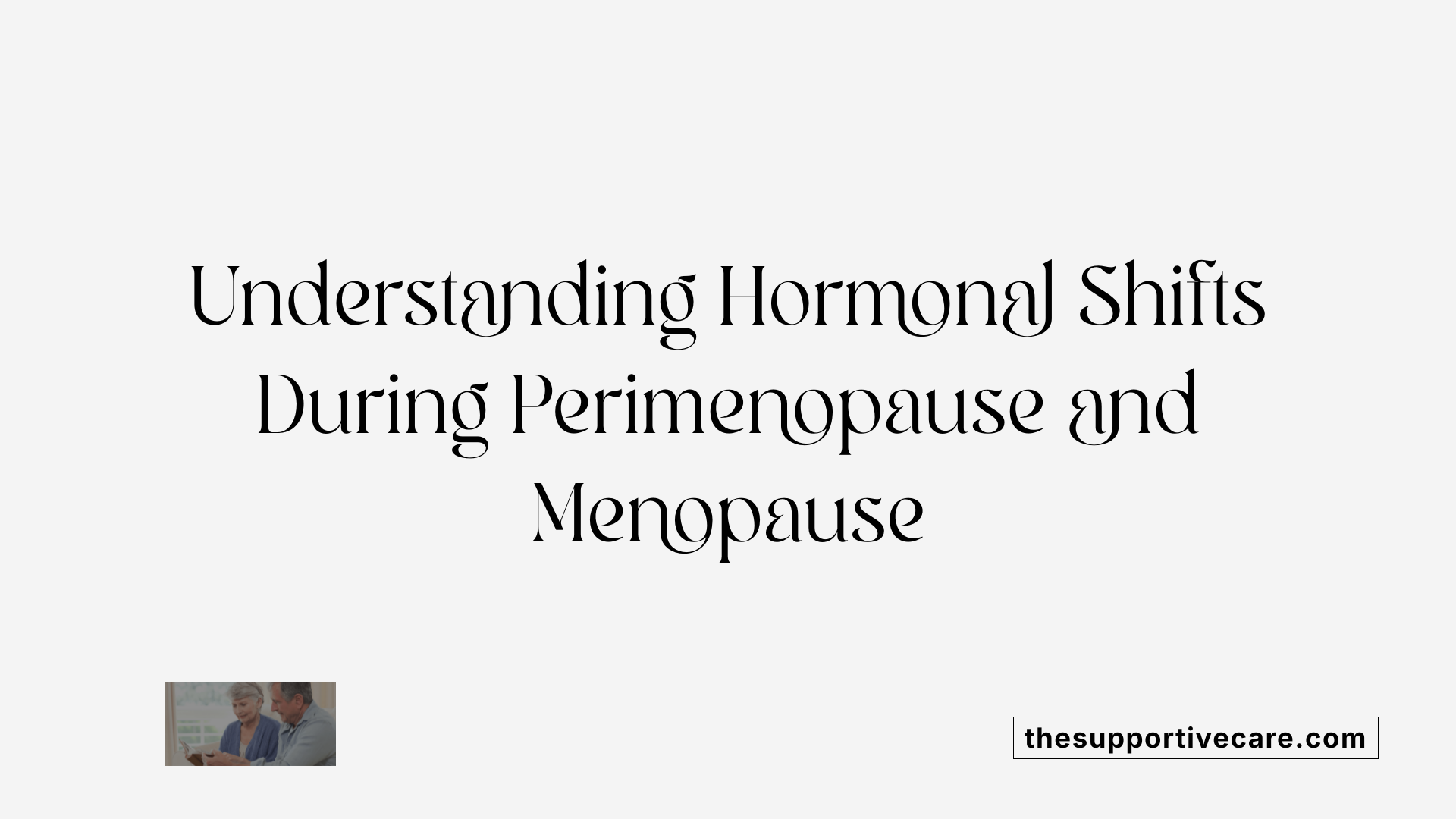
What hormonal changes occur during perimenopause and menopause?
Perimenopause, which typically begins 3-4 years before menopause, is characterized by unpredictable fluctuations in estrogen and progesterone levels. Menopause itself is defined by the cessation of menstruation for one year, usually occurring around age 51. These hormonal fluctuations disrupt the body's normal balance and directly affect the brain's chemistry and function.
How do these hormonal changes affect mood and emotional well-being?
The instability of estrogen and progesterone during perimenopause can cause significant mood swings and emotional disturbances. Women often experience increased irritability, anxiety, and depression due to altered neurotransmitter activity affected by these hormones. Hormonal shifts impact the balance of key mood-regulating chemicals such as serotonin and GABA, contributing to emotional instability.
What are common menopausal symptoms that contribute to psychological distress?
Typical menopausal symptoms include hot flashes, night sweats, sleep disturbances, joint pain, and vaginal discomfort. These physical symptoms often exacerbate mental health challenges by causing sleep loss and chronic discomfort, which heighten psychological stress and emotional exhaustion. Women may also face challenges around self-esteem and body image as hormonal changes affect their physical appearance and well-being.
Why is there an increased risk of depression and anxiety during menopause?
Women undergoing menopause have a higher risk of developing or worsening depression and anxiety, especially those with a history of pre-existing mental health issues like depression or postpartum depression. The decline in estrogen, which normally supports mood regulation, is a critical factor. This hormonal reduction affects neurotransmitter systems and the stress response, increasing susceptibility to mood disorders during this vulnerable period.
In summary, the hormonal fluctuations inherent in perimenopause and menopause exert profound effects on mental health in aging women. These changes disrupt brain chemistry and heighten the risk of mood disorders, while physical symptoms amplify psychological distress, underscoring the importance of specialized care and support during this life stage.
The Psychological Effects of Menopausal Symptoms and Their Influence on Recovery
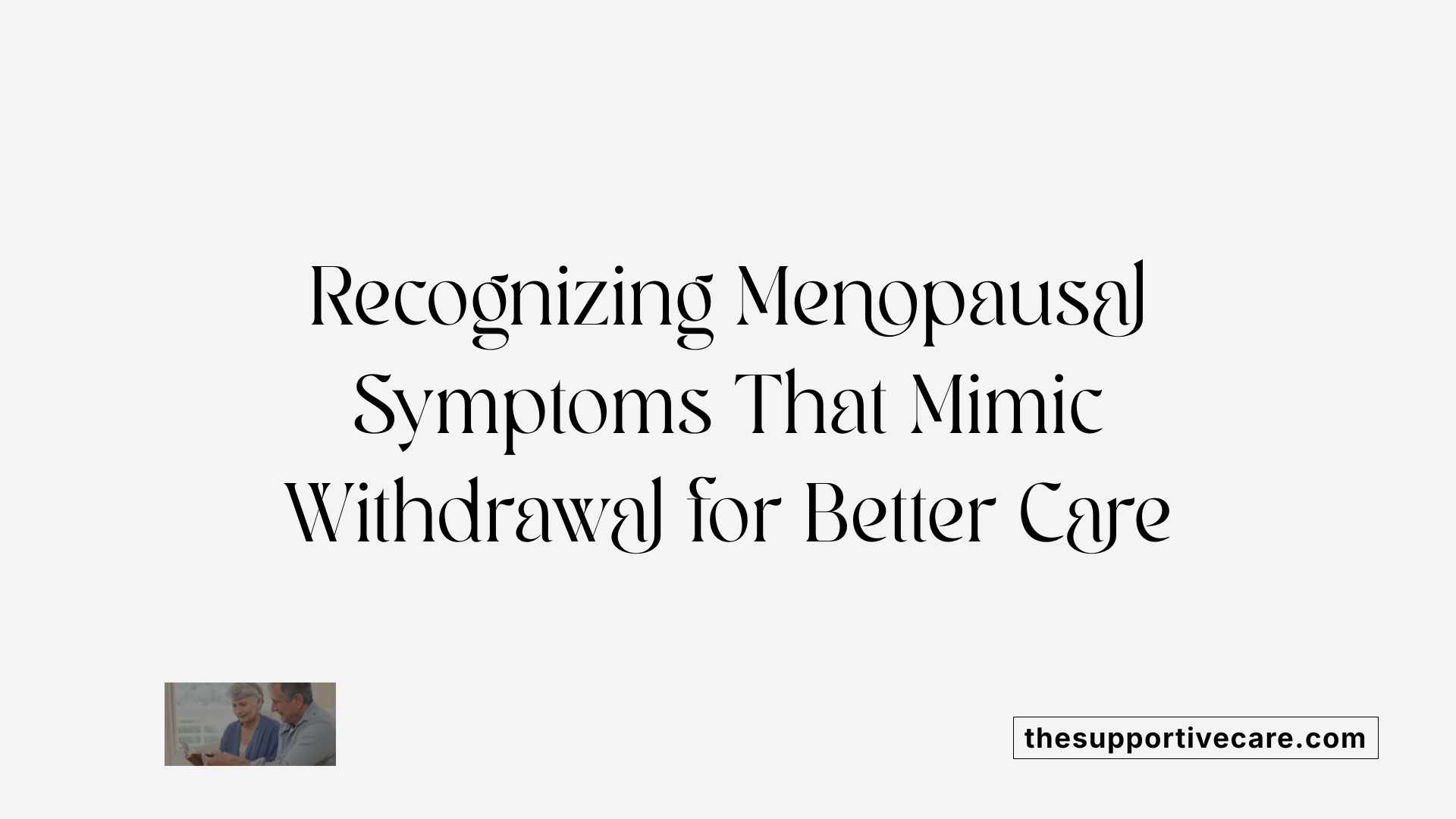
How do menstrual, peri-menopausal, and menopausal symptoms resemble withdrawal effects during recovery?
Women in recovery often experience physical and emotional symptoms tied to menstrual cycles, perimenopause, and menopause that closely mirror those of drug withdrawal. Common symptoms include hot flushes, headaches, mood swings, and emotional disturbances. These overlapping signs make it challenging for women and clinicians to differentiate between natural hormonal changes and withdrawal outcomes.
What challenges arise in distinguishing menopausal symptoms from addiction recovery symptoms?
The similarity in symptom profiles creates a diagnostic challenge. Menopausal symptoms such as sleep disturbances, anxiety, and irritability can be mistaken for relapse warning signs or ongoing withdrawal discomfort. This overlap may lead to misattribution of symptoms, resulting in inappropriate treatment adjustments or overlooked hormonal influences.
How can misinterpretation of symptoms potentially trigger relapse?
When menopausal symptoms are misunderstood or dismissed, they can heighten anxiety and distress for women in recovery. This emotional strain may increase vulnerability to relapse as women seek relief from unmanaged symptoms. Unaddressed mood instability and physical discomfort might drive some to resume substance use as a coping mechanism.
Why is it important for health professionals to maintain sensitive awareness?
Healthcare providers need to comprehensively understand how aging and hormonal changes affect women in recovery. Sensitive recognition of menopause-related symptoms allows tailored interventions that address both addiction and hormonal health. Educating professionals on this intersection is crucial to prevent misdiagnosis, reduce anxiety, and support sustained recovery through appropriate symptom management and emotional support.
Mental Health Conditions Prevalent in Aging Adults and Their Hormonal Links
Prevalence of Depression, Dementia, Parkinson’s Disease, and Psychosis in Older Adults
Aging adults face increased risks for several mental health disorders, including depression, dementia, Parkinson’s disease, and late-onset psychosis. Depression affects up to 2% of individuals over 55 years old and is often accompanied by other conditions such as dementia and psychosis. Parkinson’s disease, characterized by tremors and slow movement, impacts approximately 1% of people over 60, illustrating its significant presence in older populations.
Role of Neurotransmission Changes in Aging Mental Health
Aging brings changes in brain neurochemistry, notably a decline in GABAergic activity—the neurotransmitter system responsible for calming neural excitation. This decrease can contribute to mood instability and depression among elderly individuals. Altered neurotransmitter balance also plays a role in cognitive decline and susceptibility to neurodegenerative diseases.
Cognitive Decline and Hormonal Interplay
Dementia, especially Alzheimer’s disease, is marked by amyloid plaque buildup and memory impairment. Hormonal changes during aging, including reduced sex hormone levels, may exacerbate cognitive deficits. Emerging research points to the influence of hormones such as estrogen on brain function and their protective effects against cognitive decline.
Impact of Hormonal Dysregulation on Mental Health Disorders
Hormonal imbalances, including fluctuations in cortisol and sex hormones, significantly impact mental health in older adults. Elevated cortisol levels from chronic stress can worsen depression and increase relapse risks in those with substance use disorders. Decreasing estrogen during aging contributes to mood disturbances and heightens vulnerability to mental illnesses.
These interconnected factors underscore the importance of recognizing hormonal and neurochemical changes in managing mental health disorders among the aging population.
Substance Abuse in Older Adults: Accelerated Aging and Hormonal Dysfunction
Increasing Prevalence of Substance Use in Elderly Populations
Substance abuse among older adults is on the rise, including the non-medical use of prescription drugs such as sedatives and opioids, and alcohol. This trend often goes unnoticed due to underdiagnosis, as symptoms can be mistaken for other aging-related health issues. The aging population may turn to substances to manage chronic pain, insomnia, or emotional distress, leading to new or worsening addiction risks.
Addiction-Related Inflammation, Oxidative Stress, and Telomere Attrition
Addiction contributes to premature biological aging through increased inflammation and oxidative stress. High levels of stress hormones and inflammatory markers accelerate cellular damage, including telomere shortening—a biomarker of aging and cellular senescence. These processes compound the natural aging effects, leading to increased vulnerability to physical and mental health disorders in older adults struggling with substance misuse.
Hormonal Imbalances Caused by Substances and Treatment
Substance use and treatment therapies like methadone can disrupt hormone balance. Methadone therapy is known to cause hypogonadism, sexual dysfunction, lowered testosterone, hyperprolactinemia, and reduced thyroid hormone levels. Additionally, substances and their withdrawal influence key hormones such as cortisol, oxytocin, and sex hormones, which affect mood, stress response, and addiction behaviors. These hormonal dysfunctions complicate recovery and require careful monitoring.
Underdiagnosis of Addiction in the Aging Population
Addiction in older adults often remains unrecognized because symptoms mimic normal aging or other medical conditions. Healthcare providers may overlook substance misuse, leading to delayed intervention. Awareness and screening tailored to this demographic are crucial. Accurate diagnosis ensures that older adults receive appropriate treatment which addresses both addiction and its hormonal and physiological effects.
Hormones Involved in Addiction Progression and Recovery
How do oxytocin, vasopressin, and stress hormones like cortisol affect addiction?
Oxytocin plays a promising role in addiction recovery by acting on the brain's reward circuits. It interferes with addictive behaviors, influencing tolerance and dependence levels. Research indicates oxytocin may reduce withdrawal severity, helping ease the recovery process.
Vasopressin, another hormone involved in social behaviors, is linked indirectly to addiction mechanisms, particularly through its effects on stress and emotional regulation.
Cortisol, often called the stress hormone, is crucial in addiction dynamics. Acute substance use activates the hypothalamic-pituitary-adrenal (HPA) axis, raising cortisol levels. However, chronic substance use leads to tolerance of this stress response, which paradoxically increases the risk of relapse by disrupting normal stress regulation.
What is the influence of sex hormones on addiction vulnerability and recovery?
Sex hormones, especially estrogen and progesterone, significantly impact addiction trajectories in women. These hormones affect the speed with which addiction develops and the capacity for recovery. For example, estradiol appears to have protective effects, aiding smoking cessation efforts and potentially other substance recovery processes. Hormonal fluctuations during menstrual cycles, pregnancy, and menopause create varying windows of vulnerability or resilience to substance use disorders.
How do alterations in thyroid hormones relate to relapse risk?
Thyroid function is often disrupted in individuals with substance use disorders. Conditions like hypothyroidism, characterized by decreased thyroid hormone levels (TSH, T3, T4), are linked with higher relapse risk. Methadone therapy, common in opioid addiction treatment, may induce hormonal imbalances including reductions in thyroid hormones, further complicating recovery efforts.
What connections exist between adipocyte-derived hormones and addiction recovery?
Adipocyte-derived hormones such as leptin, adiponectin, and resistin are altered in individuals recovering from heroin use. These hormones reflect nutritional status and metabolic health, which are crucial in the overall recovery journey. Changes in these hormones suggest that nutritional deficits or imbalances may influence addiction progression and recovery outcomes.
| Hormone Type | Function in Addiction | Impact on Recovery |
|---|---|---|
| Oxytocin | Modulates reward circuits, reduces withdrawal | Eases addiction symptoms, supports abstinence |
| Vasopressin | Affects stress and social behaviors | Influences emotional regulation during recovery |
| Cortisol | Stress hormone elevated with acute use; tolerance increases relapse risk | Disrupted stress response can trigger relapse |
| Sex Hormones (Estrogen, Progesterone) | Affect addiction vulnerability and recovery speed | Protective effects, mood regulation during hormonal changes |
| Thyroid Hormones (TSH, T3, T4) | Dysregulation linked to increased relapse risk | Hormone imbalances hinder recovery, especially with methadone therapy |
| Adipocyte-Derived Hormones (Leptin, Adiponectin, Resistin) | Reflect nutritional and metabolic state | Nutritional imbalance influences addiction outcomes |
Dual Diagnosis Challenges: Hormonal and Mental Health Interactions in Aging Addicts
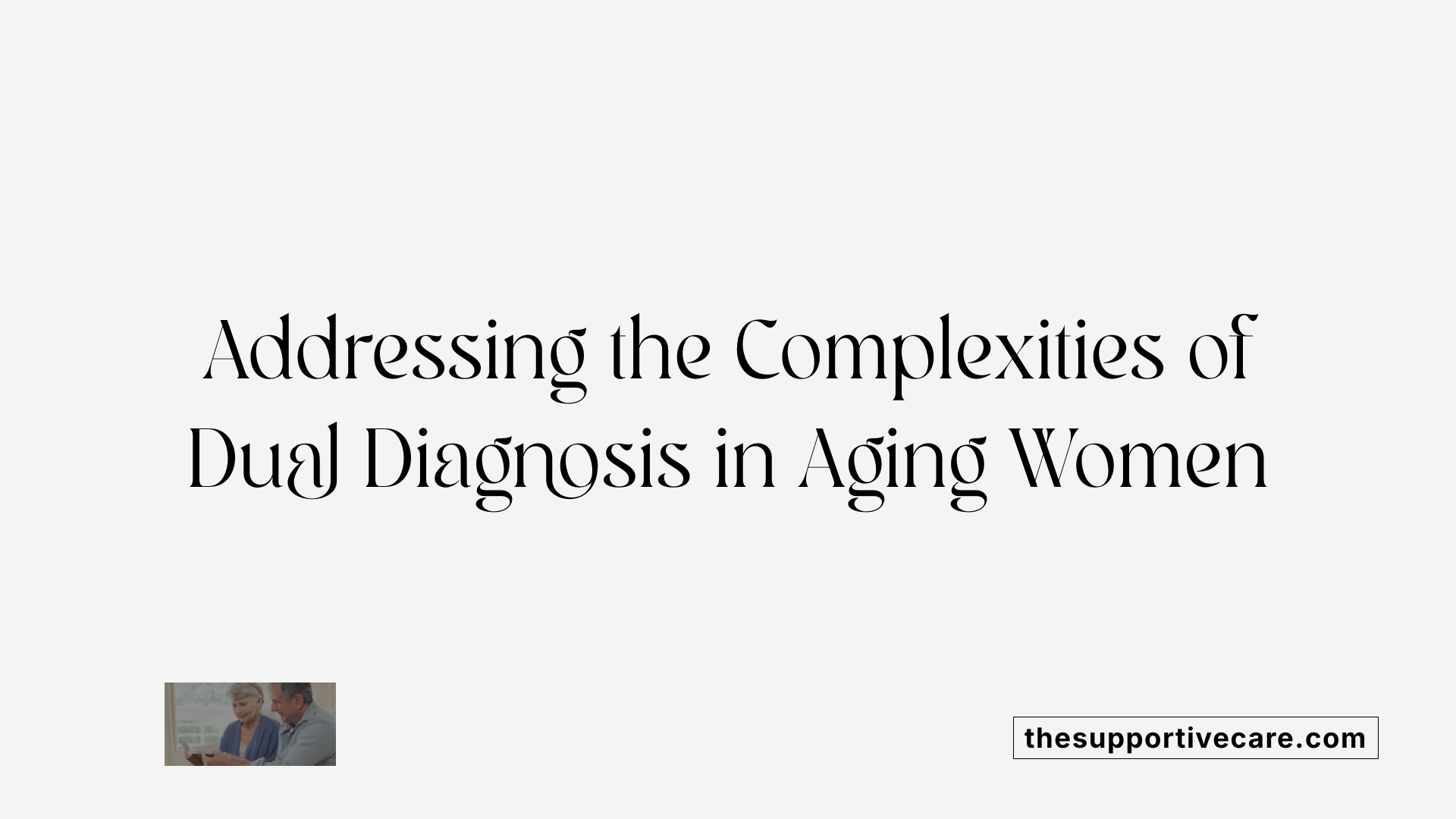
What challenges arise from co-occurring substance abuse and mental health disorders in aging adults?
Aging adults experiencing both substance abuse and mental health disorders face significant challenges. This condition, known as dual diagnosis, involves simultaneous addiction and psychiatric issues such as anxiety, depression, bipolar disorder, or psychosis. The complexity stems from overlapping symptoms and the intricate interplay between physical, mental, and hormonal health changes as people age.
Why is there a higher relapse rate and increased treatment complexity in dual diagnosis cases?
Dual diagnosis patients often experience higher relapse rates due to the intertwined nature of their conditions. Mental health disorders can trigger substance use as coping mechanisms, while drug abuse may exacerbate psychiatric symptoms. Aging increases vulnerability, as biological aging processes and chronic illnesses also impact mental state and treatment responsiveness. Hormonal fluctuations common in older women, particularly around menopause, further complicate recovery efforts, increasing stress and emotional instability that may lead to relapse.
How do hormonal influences complicate diagnosis and treatment in aging addicts with mental health disorders?
Hormonal changes, specifically fluctuations in estrogen, progesterone, cortisol, thyroid, and sex hormones, critically affect mood, cognition, and addiction pathways. For example, perimenopause and menopause can induce symptoms like mood swings, anxiety, or depression, which mimic or worsen withdrawal or mental health symptoms, making diagnosis difficult. Additionally, treatments like methadone may cause hormonal imbalances impacting recovery outcomes. Misinterpretation of these hormonal effects by healthcare providers can hinder appropriate care.
What is the importance of personalized, comprehensive care for aging individuals facing dual diagnosis?
Given the complexities, an individualized, holistic treatment approach is essential. This includes thorough hormonal assessment alongside mental health evaluation and addiction treatment. Therapies such as cognitive behavioral therapy (CBT), dialectical-behavioral therapy (DBT), and group counseling should be tailored to the unique hormonal and psychological needs of aging patients. Addressing hormonal imbalances through hormone replacement therapy or other interventions can improve mood stability and reduce relapse risks. Integrating stress management and coping strategies enhances long-term recovery and quality of life.
Gender-Specific Hormonal Patterns Impacting Addiction and Mental Health Vulnerabilities
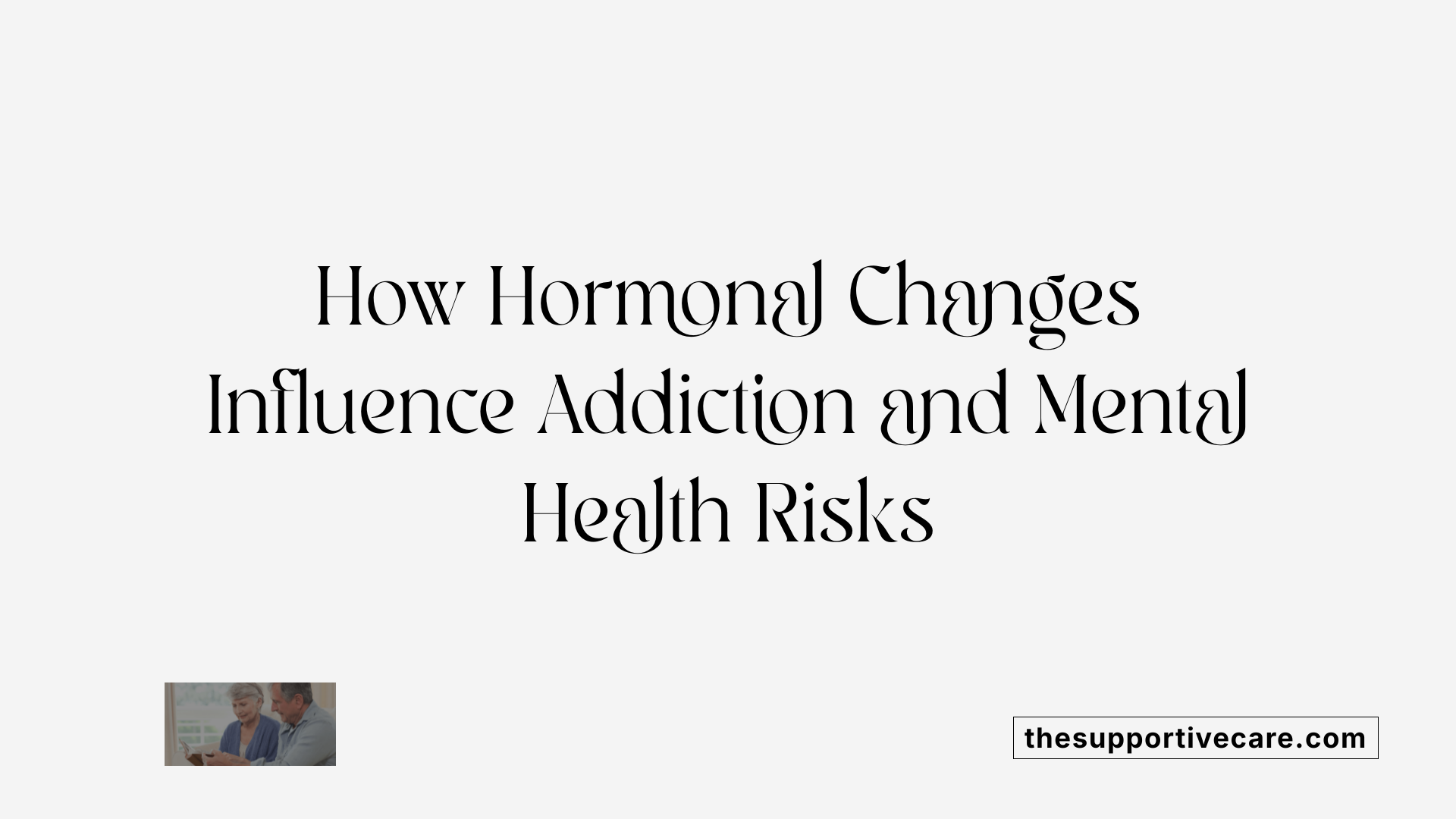
Differences in estrogen and testosterone effects on addiction susceptibility
Estrogen and testosterone influence how men and women experience addiction differently. Estrogen, a primary female sex hormone, can accelerate addiction development and also impact recovery pathways. For example, estradiol is noted to have protective effects, such as aiding smoking cessation. Conversely, testosterone in males influences reward system sensitivity and addiction behaviors distinctly. These hormonal differences shape addiction susceptibility and therapeutic responses.
How life stages (adolescence, pregnancy, menopause) influence vulnerability
Hormonal fluctuations during critical female life stages—adolescence, pregnancy, and menopause—significantly affect addiction vulnerability. During adolescence, changing hormone levels can increase risk-taking. Pregnancy induces hormonal shifts that can alter drug metabolism. Menopause and perimenopause, characterized by estrogen declines and fluctuations, are linked to mood instability and increased risk of depression and anxiety. These mental health shifts may prompt self-medication and relapse.
Faster addiction development and self-medication tendencies among women
Women often develop substance misuse problems more quickly than men and commonly use substances to cope with stress, trauma, or to manage symptoms related to hormonal changes such as mood swings or insomnia. The tendency for faster addiction development is influenced by hormonal and neurochemical mechanisms that modulate reward and stress responses. This pattern underscores the importance of gender-sensitive addiction treatment.
Increased prescription drug misuse among older women
There is a notable increase in non-medical use of prescription medications—including sedatives and opioids—among women over 50. This trend intersects with menopausal symptom management and co-occurring mental health issues, leading to risk of dependency and addiction. Understanding hormonal impacts and life-stage changes is crucial in addressing this rising public health concern through tailored interventions and increased specialist care options such as telehealth menopause counseling.
Therapeutic Approaches Incorporating Hormonal Assessments and Treatments
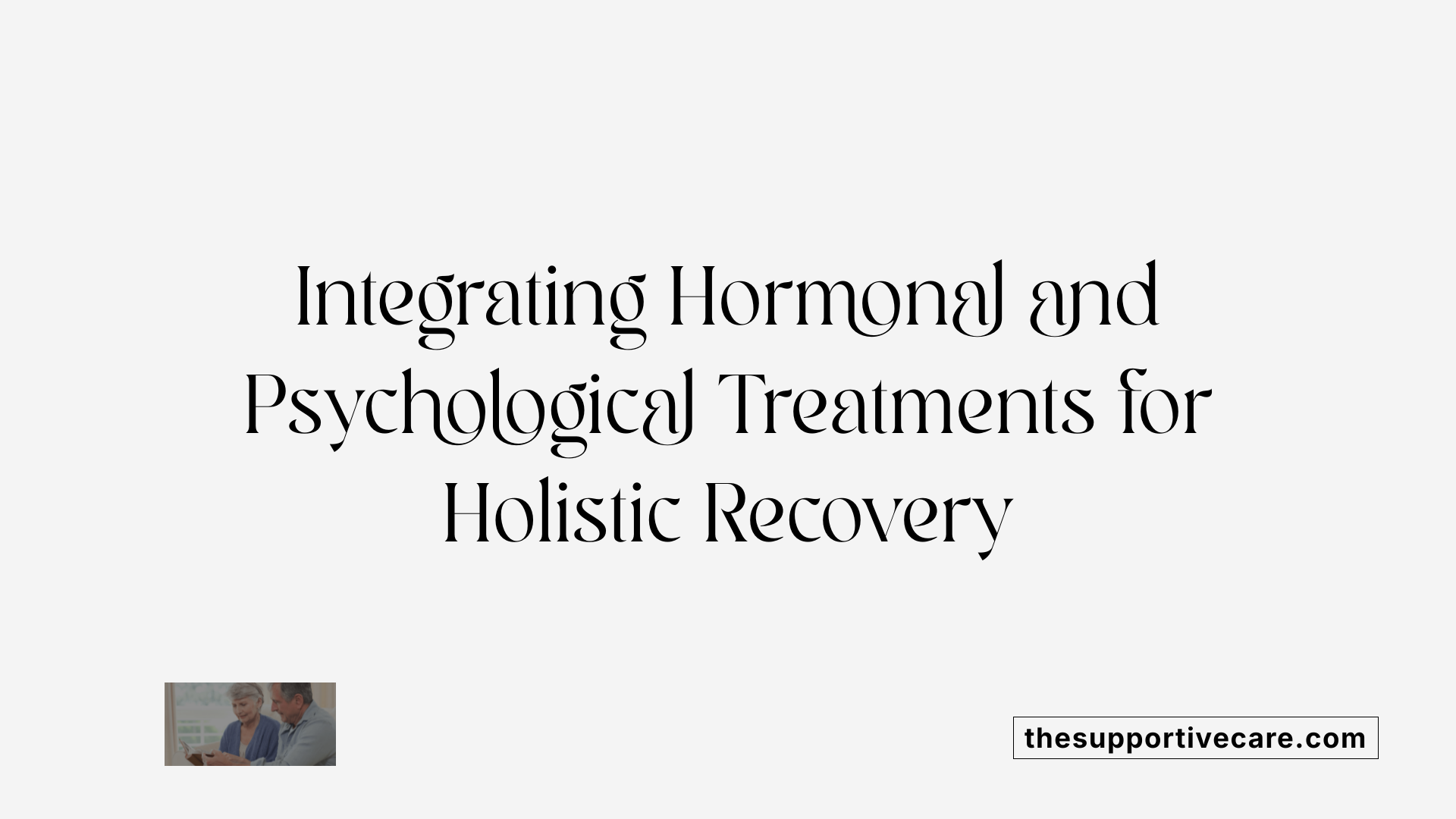
Cognitive behavioral and dialectical behavior therapies
Cognitive Behavioral Therapy (CBT) and Dialectical Behavior Therapy (DBT) are foundational treatments for older adults dealing with addiction and mental health disorders. These therapies focus on modifying dysfunctional thoughts and behaviors while teaching emotional regulation and distress tolerance skills. Group, individual, and family therapy formats help address the complex interplay between substance use, mental health symptoms, and life stressors.
Role of hormone replacement therapy for menopausal women
Hormone Replacement Therapy (HRT) plays a crucial role in managing menopausal symptoms that often coincide with withdrawal challenges. Initiated during perimenopause or within ten years of menopause, HRT stabilizes mood swings, reduces hot flashes, and may improve cognitive function. This hormonal support aids women in recovery by mitigating physical discomfort and emotional distress which, if unmanaged, could increase relapse risk.
Emerging hormone-based treatments targeting neurotransmitter systems
Research into hormone-based interventions targets disruptions to neurotransmitters like GABA, dopamine, and serotonin commonly seen in addiction. For example, oxytocin shows promise in reducing withdrawal severity by modulating reward circuits, while therapies balancing thyroid hormones aim to minimize relapse risk. Integrating these treatments can address underlying hormonal imbalances that sustain addictive behaviors.
Integrating stress management and coping strategies
Because stress hormones such as cortisol are extensively linked to addiction relapse, therapy programs emphasize stress reduction techniques. Teaching healthy coping mechanisms through psychotherapy, mindfulness, and relaxation exercises helps regulate the hypothalamic-pituitary-adrenal (HPA) axis responses. Personalized interventions incorporating hormonal assessments ensure comprehensive care that targets biological and psychological factors driving addiction.
| Therapeutic Approach | Focus Area | Patient Benefit |
|---|---|---|
| CBT and DBT | Emotional regulation, behavioral change | Reduced relapse, improved mental health |
| Hormone Replacement Therapy | Menopause symptom relief | Mood stabilization, decreased physical symptoms |
| Hormone-based Neurotransmitter Treatments | Correct hormonal imbalances affecting addiction | Diminished withdrawal severity, relapse prevention |
| Stress Management | Cortisol regulation, healthy coping | Enhanced resilience, lower addiction vulnerability |
Barriers to Effective Care: Limited Access to Menopause Expertise and Specialized Addiction Services
Scarcity of Certified Menopause Specialists
There are only about 1,800 certified menopause specialists worldwide, highlighting a significant gap in expert care availability for women navigating menopause, especially in the context of addiction recovery. This shortage creates challenges for women looking for specialized support that integrates hormonal changes with substance misuse treatment.
Telehealth as a Solution for Rural Populations
To bridge the accessibility gap, telehealth services have become an essential tool. These services enable women living in rural or underserved areas to connect with menopause experts and addiction specialists without the need to travel long distances. Telehealth facilitates timely diagnosis and management of menopausal symptoms alongside addiction care, making comprehensive treatment more feasible.
Innovative Specialized Addiction Therapies
Specialized addiction treatment clinics are adopting innovative therapies tailored to women’s unique needs. These include Eye Movement Desensitization and Reprocessing (EMDR) to address trauma, Transcranial Magnetic Stimulation (TMS) for mental health conditions, and equine-assisted therapy that combines physical activity with emotional healing. Incorporating such therapies helps address co-occurring mental health disorders that often accompany substance use.
Training Healthcare Providers in Hormonal and Addiction Care
Improving treatment outcomes depends on educating and training healthcare providers on the impacts of hormonal fluctuations during menopause and addiction recovery. Programs focused on evidence-based menopause management and addiction treatments prepare providers to recognize overlapping symptoms, offer integrated care, and reduce misdiagnosis. Stanford Medicine’s Program in Menopause and Healthy Aging exemplifies efforts to advance such training and research.
Together, expanding access to menopause expertise, leveraging telehealth, and enhancing specialized addiction therapies are critical steps to overcoming barriers in holistic care for women in recovery.
The Role of Trauma and Aging on Hormonal and Mental Health Interactions
Long-term bodily impact of trauma on mental and physical health
Women in recovery from illicit drug use often carry the invisible scars of past physical and sexual trauma. This trauma is not just psychological—it resides in the body, manifesting as ongoing mental and physical health challenges. Chronic conditions and heightened bodily sensations can persist long after the trauma occurred, complicating recovery efforts.
How trauma compounds the effects of hormonal changes and addiction recovery
As women age, natural hormonal fluctuations during stages like perimenopause and menopause add complexity to the recovery process. Symptoms such as mood swings, hot flashes, headaches, and sleep disturbances may overlap with both trauma responses and withdrawal symptoms, making accurate diagnosis and treatment challenging. Hormonal imbalances associated with addiction and trauma further disrupt emotional stability.
Increased anxiety and relapse risks from untreated trauma
Unaddressed trauma can elevate anxiety levels, which in turn may resemble or amplify menopausal symptoms. This heightened anxiety and misinterpretation of bodily signals can increase the risk of relapse during recovery. Women often feel misunderstood or dismissed by healthcare providers when their symptoms are not fully acknowledged, exacerbating feelings of isolation and vulnerability.
Importance of trauma-informed care in comprehensive treatment
Incorporating trauma-informed care is vital for addressing the intertwined effects of trauma, hormonal changes, and addiction recovery. Treatment must recognize the embodied nature of trauma and its impact on mental and physical well-being, ensuring women receive empathetic, holistic support. This approach is essential for reducing relapse risk and improving health outcomes for aging women in recovery.
Holistic Considerations: Physical Health, Self-Esteem, and Hormonal Influence in Aging Recovery
What physical symptoms do women in recovery commonly experience during aging?
Women in recovery often face physical symptoms such as joint pain, sleep disturbances, and fatigue. These ailments become more apparent when they reduce or stop drug use, increasing bodily awareness. For example, menopausal symptoms like hot flashes and night sweats can compound these issues, adding additional discomfort during the recovery journey.
How do hormonal changes impact self-confidence and body image?
Hormonal fluctuations during perimenopause and menopause affect emotional well-being, mood, and self-esteem. Declining estrogen levels can create mood swings, anxiety, and depressive symptoms. Additionally, physical changes including weight gain and sleep disruptions can negatively affect body image and confidence, making psychological distress more likely.
Why are women at risk of substance misuse as self-medication for menopausal symptoms?
Many women turn to alcohol or prescription drugs to manage challenging menopausal symptoms such as insomnia, pain, and emotional fluctuations. This self-medication can lead to dependency and addiction, particularly given women’s tendency to develop substance misuse problems more rapidly than men.
Why is integrated care that addresses body, mind, and hormones essential for aging women in recovery?
Recovery support that includes management of physical health, mental well-being, and hormonal balance is crucial. Hormonal imbalances and associated symptoms require attention alongside mental health therapies to reduce relapse risk and improve outcomes. Interventions that consider stress, trauma, self-esteem, and hormonal fluctuations offer a more comprehensive treatment approach addressing the full spectrum of women’s experiences.
| Aspect | Examples | Impact on Recovery |
|---|---|---|
| Physical Symptoms | Joint pain, sleep problems, fatigue | Increased bodily awareness, discomfort |
| Hormonal Changes | Estrogen decline, mood swings | Affect mood, self-esteem, and body image |
| Substance Misuse Risks | Alcohol, prescription drugs | Self-medication leading to relapse or dependency |
| Integrated Care Importance | Hormonal therapy, mental health support | Enhanced outcomes, relapse prevention |
Bridging Hormonal Science and Mental Health Care for Aging Adults
The intricate interplay between hormonal fluctuations and mental health profoundly influences the aging process, especially for adults navigating addiction and recovery. Recognizing hormonal dynamics — from the neuroendocrine changes of menopause to the endocrine disruptions tied to substance use — is essential to improving mental health outcomes. Targeted hormonal assessments, personalized therapy approaches, and increased access to specialized care can mitigate risks such as relapse and psychological distress. Ultimately, advancing holistic, hormone-informed treatment protocols promises a better quality of life for aging adults, ensuring they receive compassionate care that honors both their biological and psychological complexities.
References
- Paying Attention to Women's Ageing Bodies in Recovery From ...
- How Does Aging Affect Mental Illness and Addiction?
- Mental health and menopause: There are connections and ...
- Hormones can influence drug addiction-A narrative review
- Menopause, mental health, substance abuse, and addiction
- The Impact of Hormones on Substance Use Disorders



































































































